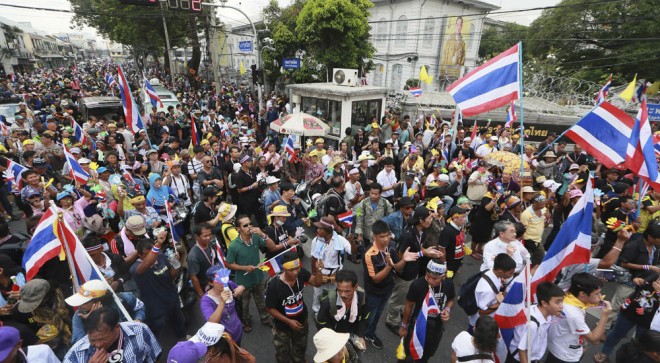Thai political protests paralyze more ministries

Anti-government protesters gather outside Interior Ministry in Bangkok, Thailand, Tuesday, Nov. 26, 2013. Protesters forced the closure of several government ministries Tuesday and vowed to take control of state offices nationwide in a bid to oust Prime Minister Yingluck Shinawatra, escalating the biggest challenge she has faced since taking office. AP
BANGKOK—Thai opposition protesters besieged several more ministries in Bangkok on Tuesday to try to topple the government, as Prime Minister Yingluck Shinawatra faced a no-confidence motion in parliament and warned against “mob rule.”
Tens of thousands of demonstrators have rallied against Yingluck and her brother, ousted premier Thaksin Shinawatra, in the biggest street protests since 2010, when more than 90 people were killed in a military crackdown.
Demonstrators surrounded the interior, agriculture, transport, and sports and tourism ministries, ordering officials inside to leave, a day after occupying the finance and foreign ministries.
Suthep Thaugsuban, the rabble-rousing leader of the anti-government protests, called late Tuesday for demonstrators to rally at the “remaining government ministries” and provincial offices nationwide on Wednesday.
“You must do it tomorrow, together across the country… there will be no other day,” he added.
Article continues after this advertisementThe turmoil has caused international concern and raised fears of fresh street violence in a country that has been rocked by several episodes of political unrest since royalist generals overthrew Thaksin in a 2006 coup.
Article continues after this advertisementThe billionaire telecoms tycoon-turned-politician draws strong support from many of the country’s rural and urban working class. But he is loathed among the elite and the middle classes, who accuse him of being corrupt and a threat to the monarchy.
Several thousand protesters, waving Thai flags and blowing whistles, marched to the interior ministry, which was guarded by hundreds of security personnel, according to an AFP reporter at the scene.
“We don’t dislike Thaksin—we loathe him. This is the end for him,” said Dhiranut Bunna, a 43-year-old housewife from Bangkok who was among the protesters still at the finance ministry.
Apart from the interior ministry, most government buildings taken over had only a light security presence outside.
But security has been tightened on Bangkok’s streets since the expansion late Monday of the Internal Security Act, which gives authorities additional powers to block routes, impose a curfew, ban gatherings and carry out searches.
Arrest warrant
A Thai court on Tuesday approved an arrest warrant for Suthep—who resigned from the opposition Democrat Party to head the rallies—in connection with the occupation of government buildings.
“I ask him to surrender, otherwise police can arrest him on sight,” said Colonel Sunthorn Kongklam of Bang Sue police station in the capital.
In his near 90-minute speech, Suthep said he will hand himself in but added—to rapturous applause—”now I am busy, let me deal with the Thaksin regime first.”
Yingluck on Tuesday reiterated that authorities would “absolutely not use violence” as she arrived at parliament, which was guarded by dozens of police.
“Everybody must obey the law and not use mob rule to upstage the rule of law,” she told reporters.
The no-confidence motion was introduced by the Democrats, who have not won an elected majority in parliament in about two decades, as part of a barrage of challenges to Yingluck’s embattled government.
Debate continued late into the night on Tuesday and the ruling Puea Thai party, which holds a comfortable majority, is expected to win the censure vote expected later in the week.
Recent protests were sparked by Puea Thai plans to introduce an amnesty that could have allowed the return from self-imposed exile of Thaksin.
Outrage over that plan failed to ebb after the amnesty was quashed by the Senate on Nov. 11.
Violent clashes “possible”
Former Thai diplomat Pavin Chachavalpongpun, an associate professor at the Center for Southeast Asian Studies at Japan’s Kyoto University, said there was a possibility of “violent clashes.”
“I think the mob has become a little bit desperate now… so there could be some kind of provocation against the police,” he told AFP.
He said the government had so far been careful to avoid any “pre-emptive action” against the rallies as it faces opposition challenges in parliament and on the streets.
“You are now seeing a kind of twin engine working to overthrow the Yingluck government,” he added.
Yingluck swept to power in 2011 polls on a wave of support from the “Red Shirts,” whose 2010 protests were crushed by the then Democrat-led government.
“Suthep is not trying to throw out the government… he wants to throw out democracy and replace it with an ultra-royalist administration,” Red Shirt leader Thida Thavornseth told AFP.
Protests by the royalist “Yellow Shirts” helped to trigger the coup that toppled Thaksin, who now lives abroad to avoid a prison term for corruption that he contends was politically motivated.—Thanaporn Promyamyai